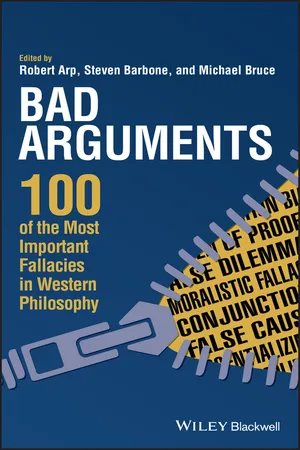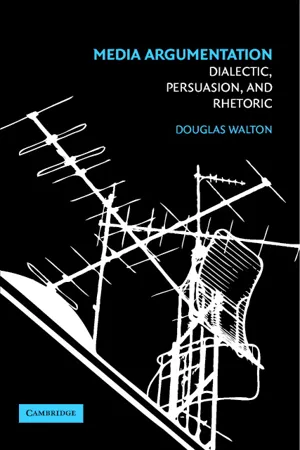Languages & Linguistics
Ad Hominem
Ad Hominem is a logical fallacy where an argument is attacked by targeting the person making the argument rather than addressing the actual points being made. This tactic attempts to discredit the opponent's character or personal traits instead of engaging with the substance of their argument. It is important to recognize and avoid ad hominem attacks in rational discourse.
Written by Perlego with AI-assistance
Related key terms
1 of 5
10 Key excerpts on "Ad Hominem"
- eBook - PDF
Dialogue Analysis IX: Dialogue in Literature and the Media, Part 2: Media
Selected Papers from the 9th IADA Conference, Salzburg 2003
- Anne Betten, Monika Dannerer, Anne Betten, Monika Dannerer(Authors)
- 2011(Publication Date)
- De Gruyter(Publisher)
For ex-ample, for many children there exists a mismatch between the language spoken at home and the language used at school. At home they may speak a dialect, an accent or a language va-riety associated with gender, social class, or ethnicity (Andersen 1990). This phenomenon reflects that people are aware of the facts that accents reflect people's ethos, which is vul-nerable to Ad Hominem. All these speakers of different social groups can gain different ethos in media because of the style of their language. 2. What is accented Ad Hominem? The conceptualization of accented Ad Hominem is based on the conception and definition of Ad Hominem. 3 The Latin term argumentum Ad Hominem, which is overwhelmingly treated in a pejorative sense currently, refers to the fallacy of attacking the opponent personally in one way or another instead of responding to the actual arguments put forward in support of the standpoint (van Eemeren/Grootendorst 1993). Three variants of personal attack are distin-guished: (1) the abusive variant, (2) the circumstantial variant, and (3) the tu quoque (you too) variant. 4 The first variant - the abusive argumentum acl hominem - is more relevant to accented Ad Hominem. Ad Hominem is viewed as a failure of relevance by most philosophers and logicians (i.e. Cohen/Nagel 1964; Copi 1972). Hamblin defined it in the Standard Treat-ment as: [...] an argument Ad Hominem is committed when a case is argued not on its mer-its but by analyzing (usually unfavorably) the motives or background of its supporters or op-A variety of accents that is very close to RP but retains a few tiny nonstandard features, see Hon-ey (2001, 96). The discussion of argumentum Ad Hominem in modern times can be dated back to the book of the 17 th century British philosopher John Locke, An Essay Concerning Human Understanding (1690). He first employed the term as a technical term (van Eemeren/Grootendorst 1992, 111). - eBook - ePub
Bad Arguments
100 of the Most Important Fallacies in Western Philosophy
- Robert Arp, Steven Barbone, Michael Bruce, Robert Arp, Steven Barbone, Michael Bruce(Authors)
- 2018(Publication Date)
- Wiley-Blackwell(Publisher)
Ad Hominem argument.Many textbook accounts of the Ad Hominem argument are much too cavalier in their approach, often treating the Ad Hominem argument form as usually/always fallacious. However, as Walton, for example, has made clear, things are not so easy. One of the greatest challenges in thinking about the Ad Hominem argument type and the possibility of particular cases being fallacious is finding a way to distinguish between those cases that are fallacious and those that aren’t. And as we will see in the chapters for the different Ad Hominem subtypes, the very same case may be considered fallacious or legitimate depending on how it is read, what the conclusion of the respondent is.This chapter deals with Ad Hominem: bias. Also see the other chapters on Ad Hominem: circumstantial (Chapter 9 ), Ad Hominem: direct (Chapter 10 ), and Ad Hominem: tu quoque (Chapter 11 ).We are very often rightly disturbed by bias, as it represents a kind of ungrounded prejudice in favor of one thing, person, group, and so on. However, is bias always problematic? What about my bias for Japanese food over Mexican? How about a salesperson’s bias for his product? One would expect a salesperson to be biased toward his product. However, bias becomes a problem in contexts in which the goal is fairness and the discovery of impartial truth, as far as that’s possible. In such contexts, bias can be particularly pernicious as it can impede the dialogue’s goal of impartial inquiry, as it involves the “suppressing of critical doubt (when critical doubt is appropriate)” (Walton 1998 , 132). Further, accusing someone of bias can be a powerful way of impugning her character and making suspect what she says since it is purportedly driven by bias. Such is an Ad Hominem - eBook - PDF
- Irving M. Copi, Carl Cohen, Victor Rodych, Kenneth McMahon(Authors)
- 2018(Publication Date)
- Routledge(Publisher)
4.3 Fallacies of Relevance 107 transformed, by unfair fallacious argument, into adversaries. Every fallacious argument presents some risk of this kind; the fallacy of the straw man invites it with special force. R5. Argument against the Person ( Argumentum Ad Hominem ) Of all the fallacies of irrelevance, the argument against the person , or Ad Hominem , is among the most pernicious. Such arguments are common, as many fallacies are. These, in addition to being unfair to the adversary (as straw man arguments are also), are hurt-ful, often inflicting serious personal damage without any opportunity for the fallacy to be exposed or its author chastised. The phrase Ad Hominem translates as “against the person.” An Ad Hominem argument is one in which the thrust is directed, not at a conclusion, but at some person who defends the conclusion in dispute. This personalized attack might be conducted in either of two different ways, for which reason we distinguish two major forms of the argument Ad Hominem : the abusive and the circumstantial . A. Argumentum Ad Hominem , Abusive One is tempted, in heated argument, to disparage the character of one’s opponents, to deny their intelligence or reasonableness, to question their understanding, or their seriousness, or even their integrity. However, the character of an adversary is logically irrelevant to the truth or falsity of what that person asserts, or to the correctness of the reasoning employed. A proposal may be attacked as unworthy because it is supported by “radicals,” or by “reactionaries,” but such allegations, even when plausible, are not relevant to the merit of the proposal itself. Personal abuse can be psychologically persuasive, however, because it may induce strong disapproval of some advocate, and by unjustifiable extension in the mind of the hearer, disapproval of what had been advocated. - eBook - PDF
Media Argumentation
Dialectic, Persuasion and Rhetoric
- Douglas Walton(Author)
- 2007(Publication Date)
- Cambridge University Press(Publisher)
As shown in this case study, the real function of an Ad Hominem argument (when properly used) is to attack an arguer’s credibility in order to criticize the argument she advocates. Before going any further, it is necessary to remind ourselves of some considerations on multi-agent argumentation from chapters 1 and 2. A multi-agent structure of argumentation always involves two parties (in the minimum case) in a dialogue. An Ad Hominem argument is the use of personal attack in a dialogue exchange between two parties, where the one party attacks the character of the other party as bad in some respect, and then uses this attack as a basis for criticizing the other party’s argu- ment. An argument is fallacious if it is a special baptizable (Johnson 1987) type of argument that is used in such a way by one party in a dialogue exchange that it blocks or interferes with the collaborative realization of the goal of the type of dialogue that the two participants are supposed to be engaged in (Walton 1995). Thus, there is a difference between a weak argument that is open to critical questioning and a fallacious argument. The general point is that a fallacious argument has to be worse than just weak, or unsuccessful in fulfilling a burden of proof. A fallacious argu- ment is a tricky, deceptive sophistical tactic, used to try to get the best of a speech partner in a way that is inappropriate as a collaborative contribu- tion to the dialogue exchange. At any rate, let us now go on to examine two cases. The first one is a classic case of the use of the circumstantial Ad Hominem argument in political discourse. The second appears to be somewhere on the borderline between argument from commitment and circumstantial Ad Hominem argument. - No longer available |Learn more
- (Author)
- 2014(Publication Date)
- Orange Apple(Publisher)
________________________ WORLD TECHNOLOGIES ________________________ Chapter- 6 Red Herring Fallacies 1. Ad Hominem An Ad Hominem (Latin: to the man), also known as argumentum Ad Hominem , is an attempt to link the validity of a premise to a characteristic or belief of the person advocating the premise. The Ad Hominem is a classic logical fallacy, but it is not always fallacious. For in some instances, questions of personal conduct, character, motives, etc., are legitimate and relevant to the issue. Types of Ad Hominems Ad Hominem abuse Ad Hominem abuse (also called personal abuse or personal attacks) usually involves insulting or belittling one's opponent in order to invalidate his or her argument, but can also involve pointing out factual but ostensible character flaws or actions which are irrelevant to the opponent's argument. This tactic is logically fallacious because insults and even true negative facts about the opponent's personal character have nothing to do with the logical merits of the opponent's arguments or assertions. Examples: • You can't believe Jack when he says the proposed policy would help the economy. He doesn't even have a job. • Candidate Jane's proposal about zoning is ridiculous. She was caught cheating on her taxes in 2003. Ad Hominem circumstantial Ad Hominem circumstantial points out that someone is in circumstances such that he is disposed to take a particular position. Ad Hominem circumstantial constitutes an attack on the bias of a source. This is fallacious because a disposition to make a certain argument does not make the argument false; this overlaps with the genetic fallacy (an argument that a claim is incorrect due to its source). ________________________ WORLD TECHNOLOGIES ________________________ Where the source taking a position seeks to convince us by a claim of authority, or personal observation, observation of their circumstances may reduce the evidentiary weight of the claims, sometimes to zero. - eBook - PDF
Fallacies
Selected Papers 1972–1982
- John Woods, Douglas Walton(Authors)
- 2019(Publication Date)
- De Gruyter Mouton(Publisher)
Hence the heavier body moves with less speed than the lighter; an effect which is contrary to your supposition. Perhaps little more needs to be said to show that the Ad Hominem under Locke's description of it can be a correct and impeccable method of argument. But in that view can the Ad Hominem be a fallacy at all? Certainly to argue from an adversary's premiss is a procedure that might be abused, or indulged in excessively, or confused with an appeal to independent evidence. But it is difficult to see how such abuses, even assuming them to be reasonably specifiable, should be identified with what is represented as the Ad Hominem in modern logic texts. Much the same disparity is suggested in the account of a Twentieth Century Lockean, Henry W. Johnstone, Jr., who goes so far as to propose in [110] that all correct philo-sophical arguments are Ad Hominem. According to Johnstone, philosophical arguments are typically indifferent or impervious to all evidence external to themselves, and thus that only con-sequences drawn internally from a philosophical view suffice for its refutation. Evidently Johnstone's view is an extension of the Lockean notion; each construes the Ad Hominem more broadly than modern texts allow. 2. THE STANDARD VIEW We shall take as our touchstone of analysis the more standard contemporary view, namely, that the Ad Hominem is a fallacy of personal abuse or specious circumstantial refutation. We will eschew the Locke-Johnstone viewpoint since, as will presently emerge, it is too inclusive to capture what we consider the critical cases. Our own orientation reflects a determination to track down the fallacy. It is as a significant logical error, a snare and a delusion, that the Ad Hominem is interesting, a device whereby the measure, to use Bentham's terms, is defeated by impugning the man. Entirely typical forms of this type of argument are illustrated by Arnauld [11]: 58 Chapter 5 He is a man who owns nothing. Therefore, he is wrong. - eBook - ePub
- Carol Winkler(Author)
- 2019(Publication Date)
- Routledge(Publisher)
PART VIIEvaluating Argumentation Networks
Passage contains an image
63
David Cratis Williams and Dale HampleRising to the defense of Ad Hominem ArgumentsArgumentation scholars classically identify attacks on the author of an argument, rather than the argument’s content, as an Ad Hominem fallacy. The justification for regarding this tactic as fallacious has been that only the argument’s content should matter and that even a bad person can make a good argument. This position has been recognized as too simple for several decades, but it is nonetheless where one begins thinking about arguments that attack the other person.Today, the field of argumentation studies distinguishes three types of Ad Hominem (Copi, 1982; van Eemeren, Garssen, & Meuffels, 2009; Walton, 1998; Walton, Reed, & Macagno, 2008): (a) direct or abusive: a nasty attack on the other person’s character, nature, intelligence, etc.; (b) indirect or circumstantial: the other person has special circumstances that result in a vested interest or invalid perception, etc., that render what she or he says as mere rationalization; and (c) “you too” or tu quoque : the other person has said or done other things that are not consistent with what she or he is saying now. All three types share that they either move a judgment about the speaker to his/her argument (abusive and circumstantial) or they judge the argument by connecting it to the arguer (tu quoque ).Argumentation studies also recognizes that attacks on the other arguer are not necessarily illegitimate. The standard example is that of impugning the credibility of a witness in court. Another would be attacking the expertise of a person who advocates have proposed as an authority. Both illustrations constitute legitimate matters of substance. Worth noting, however, is that utilizing traditional analysis, these tactics really should not be decisive. A biased woman or evil man can still say a correct thing. Even legitimate attention to the arguer’s nature only justifies doubt about the argument. The central question remains: Is our intuition that aggressive evaluations of a witness’s honesty or an authority’s credentials substantively defensible? - eBook - PDF
Logic and Contemporary Rhetoric
The Use of Reason in Everyday Life
- Frank Boardman, Nancy Cavender, Howard Kahane, , Frank Boardman, Nancy Cavender, Howard Kahane(Authors)
- 2017(Publication Date)
- Cengage Learning EMEA(Publisher)
(An Ad Hominem argument, literally, is an argument “to the person.”) Public Ad Hominem attacks reached a kind of zenith in the 2016 presidential cam-paign and especially in the person of Donald Trump. Trump often met the need for reasoned argument with abusive personal attacks and name-calling. In Trump’s imagi-nation and discourse, “losers,” “dummies,” “morons,” “idiots,” and “zeros” included a number of journalists, editors, activists, protestors, novelists, academics, congresspeo-ple, presidents, cabinet members, fellow candidates, former members of his own staff, judges, athletes, musicians, filmmakers, business executives, foreign leaders, actors, radio hosts, comics, bloggers, websites, newspapers, individual Twitter users, and a brand of whiskey. 4 Copyright 2018 Cengage Learning. All Rights Reserved. May not be copied, scanned, or duplicated, in whole or in part. WCN 02-300 8 4 C H A P T E R 4 Even if Trump was extraordinarily bold about it, he is not alone in reducing himself to Ad Hominem attacks. Too many people in 2016 stooped down to his level. Senator Elizabeth Warren called Trump a “loser.” Senator and presidential candidate Ted Cruz called him a “coward.” And former presidential candidate Michael Dukakis called him “nuts.” It is important not to confuse Ad Hominem arguments with those in which the fallacy is straw man. The difference is that straw man attacks misrepresent an opponent’s posi-tion, whereas those that are Ad Hominem abuse an opponent directly. ATTACKS ON CHARACTER OR CREDENTIALS SOMETIMES ARE RELEVANT Although attacks on a person usually are irrelevant to that individual’s arguments or claims, sometimes they are very relevant indeed. Lawyers who attack the testimony of courtroom witnesses by questioning their expertise or character are not necessarily guilty of arguing Ad Hominem. They may be trying to gauge the integrity of the witness to determine whether his or her testimony is credible. - eBook - ePub
- Peter Houtlosser, Agnes van Rees, Peter Houtlosser, Agnes van Rees(Authors)
- 2014(Publication Date)
- Routledge(Publisher)
CHAPTER 10David HitchcockThe Pragma-Dialectical Analysis of the Ad Hominem FallacyMcMaster UniversityTHE “STANDARD TREATMENT” TODAYThe most popular contemporary North American introductory logic texts treat the argumentum Ad Hominem as a generic fallacy, divided into three species—Ad Hominem abusive, Ad Hominem circumstantial, and tu quoque (Copi & Cohen, 2002, p. 143–145; Hurley, 2003, pp. 118–121). Hurley (2003) characterizes the genus as the fallacy of responding to someone’s argument by directing attention to its author (p. 118 ), Copi and Cohen (2002) as fallacious abuse, direct or indirect, of one’s adversary (p. 145 ).The abusive Ad Hominem responds with direct verbal abuse; it is said to be a mistake because possession of a stigmatized trait is irrelevant to whether the premisses of its possessor’s argument support its conclusion (Hurley 2003, p. 118) or the argument is correct (Copi & Cohen 2002, p. 143). Copi and Cohen extend the concept to direct abuse in response to a statement, which they claim to be a fallacy because the author’s character is logically irrelevant to the truth or falsehood of the statement. We may take as a real-life paradigm of the abusive Ad Hominem an exchange in the Canadian House of Commons in 1970, cited by Walton (1985, pp. 203–204). The prime minister was asked if he would consider using a certain government plane, the Jet-star, to send an information-gathering team to Biafra. He responded as follows:Mr. Trudeau: It would have to refuel in the middle of the Atlantic Ocean …Mr. Hees: On a point of order, Mr. Speaker, I bought the plane for the government and I know it can make the flight with the proper stops on the way …Mr. Trudeau: I do not think it would have to stop if the hon. Member went along and breathed into the tank.The prime minister insinuates that Mr. Hees is habitually drunk. We may question our textbooks’ treatment of such direct personal attacks. It is not at all obvious that the prime minister has alluded to the alleged drinking habits of Mr. Hees in order to show that the conclusion of Mr. Hees’ argument does not follow from its premisses, or in order to show that his argument is incorrect, or in order to show that his statement is false. - eBook - PDF
Good Thinking
Seven Powerful Ideas That Influence the Way We Think
- Denise D. Cummins(Author)
- 2021(Publication Date)
- Cambridge University Press(Publisher)
Part I one The Game of Logic – What Follows from What T he 2016 US presidential race was one of the most conten- tious in recent history for one very important reason – the reliance on Ad Hominem attacks by both candidates to bolster their bids for office. Ad Hominem attacks are a type of reasoning fallacy 1 : Fallacy: Arguments that violate the rules of logical thought, but often seem plausible or even convincing. Ad Hominem Fallacy: Attacking an opponent rather than an oppon- ent’s evidence and arguments. Ad Hominem is an example of bad reasoning because a person could have a bad character yet still be conveying factual information or sound arguments. As the saying goes, even a broken clock is right twice a day. For that reason, fact-checking is a better strategy than character- checking in political debates. What we want to know is whether we can trust what we’re being told. Yet over the months-long political debacle, presidential candidates Donald Trump and Hillary Clinton repeatedly launched Ad Hominem attacks on each other to undermine each other’s credibility. Trump variously declared that “Hillary Clinton may be the most corrupt person ever to seek the presidency of the United States” and was a “world-class liar” who has engaged in “theft.” 2 Firing back, Clinton referred to supporters of Donald Trump as a “basket of deplorables”; drew parallels between Trump and Hitler; and described him as nar- cissistic, sexist, racist, and predatory in his business practices. 3 Subsequent analyses of the debates indicated that Trump and Clinton were guilty of launching a nearly equal number of Ad Hominem arguments. 4 Even more striking was the finding that the frequency of Ad Hominem use in the 2016 presidential debates was more than twice as high as it was in 2008, which reflected (and perhaps facilitated) the rise of extreme polarization in American politics.
Index pages curate the most relevant extracts from our library of academic textbooks. They’ve been created using an in-house natural language model (NLM), each adding context and meaning to key research topics.









